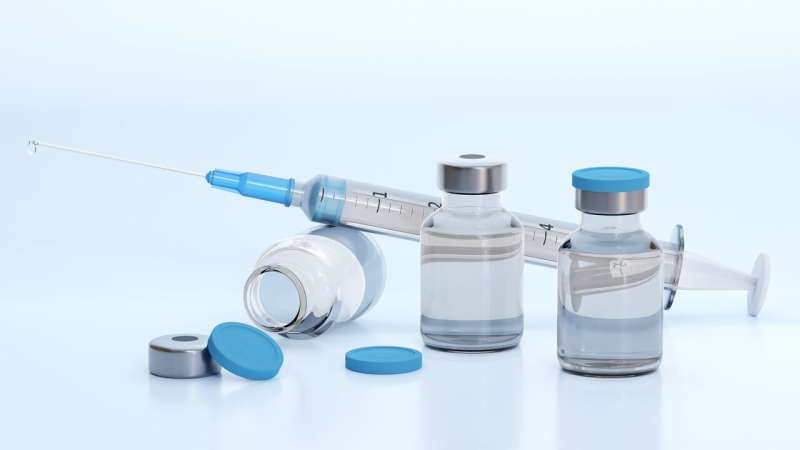This article has been reviewed according to Science X's editorial process and policies. Editors have highlighted the following attributes while ensuring the content's credibility:
fact-checked
trusted source
proofread
Global study finds some women experience heavier menstrual flow after COVID-19 vaccination

A new international study finds that women vaccinated for COVID-19 have a slightly higher risk for a heavier period after vaccination.
The study, led by Oregon Health & Science University reproductive health services researcher Blair Darney, Ph.D., M.P.H., and physician-scientist Alison Edelman, M.D., M.P.H., published today in the British Journal of Obstetrics and Gynaecology. These findings build on prior work from the same research team that first identified an association between COVID-19 vaccines and menstrual cycle changes.
While there is a growing body of evidence demonstrating that COVID-19 vaccination is associated with a small increase in cycle length, other disturbances such as bleeding quantity are less well known. This study aimed to estimate the effect of COVID-19 vaccination on menstrual bleeding quantity among individuals with normal menstrual cycles.
"Menstruation is a routine bodily function and a key indicator of overall health, so it's crucial that we understand the scope of this issue among the global population," said Edelman, one of the study's lead authors. "The more we can understand about these reported changes, the more effectively we're able to counsel individuals about what to expect with a COVID-19 vaccine and how to make an informed decision about getting vaccinated."
In a retrospective cohort study, researchers analyzed menstrual cycle data from the fertility tracking app Natural Cycles. The cohort included a total of 9,555 individuals—7,401 vaccinated and 2,154 unvaccinated—primarily living in the United States, Canada, the United Kingdom and Europe. Participants reported daily bleeding quantity as "spotting," "light," "medium" or "heavy." Researchers then examined the number of heavy bleeding days and total bleeding quantity.
Analyses showed a small—4%—increase in the percentage of participants who experienced greater total bleeding quantity following the first COVID-19 vaccine dose compared with an unvaccinated comparison group. This difference translates to an estimated 40 additional people per 1,000 normally cycling individuals who experienced more bleeding quantity. Researchers also found that these changes typically resolved by the first post-vaccination menstrual cycle.
The research team emphasizes that these findings shouldn't be a cause for concern, but should validate the public's experiences and provide reassurance that if changes in flow occur with vaccination, they are likely to be small and temporary.
"Experiencing an unexpected change in your menstrual cycle can be alarming," Darney said. "We hope this research can assure individuals that they are heard and their experiences around menstruation are valid. As was discovered in previous research, these changes at a population level are small, typically resolving in the cycle after vaccination, and generally shouldn't be a source of anxiety or fear."
Individuals who notice prolonged changes in menstruation are encouraged to seek guidance from their clinician.
While this study didn't look at why these changes occur, researchers note that there are several plausible ways in which a vaccine-prompted immune response could cause temporary menstrual changes. However, individuals naturally experience variations in menstrual cycle duration and bleeding patterns, making it challenging to isolate COVID-19 vaccination as a sole cause.
Looking forward, researchers hope to learn more about the biological mechanism of these changes, and will continue to leverage data from cycle tracking apps to investigate other reported variations in menstruation following vaccination, such as missed cycles, unexpected vaginal bleeding and pain.
Darney, Edelman and colleagues also will study the effect of COVID-19 disease on the menstrual cycle, suspecting that infection itself creates similar changes to those experienced after vaccination.
More information: Blair G. Darney et al, Impact of coronavirus disease 2019 (COVID‐19) vaccination on menstrual bleeding quantity: An observational cohort study, BJOG: An International Journal of Obstetrics & Gynaecology (2023). DOI: 10.1111/1471-0528.17471




















